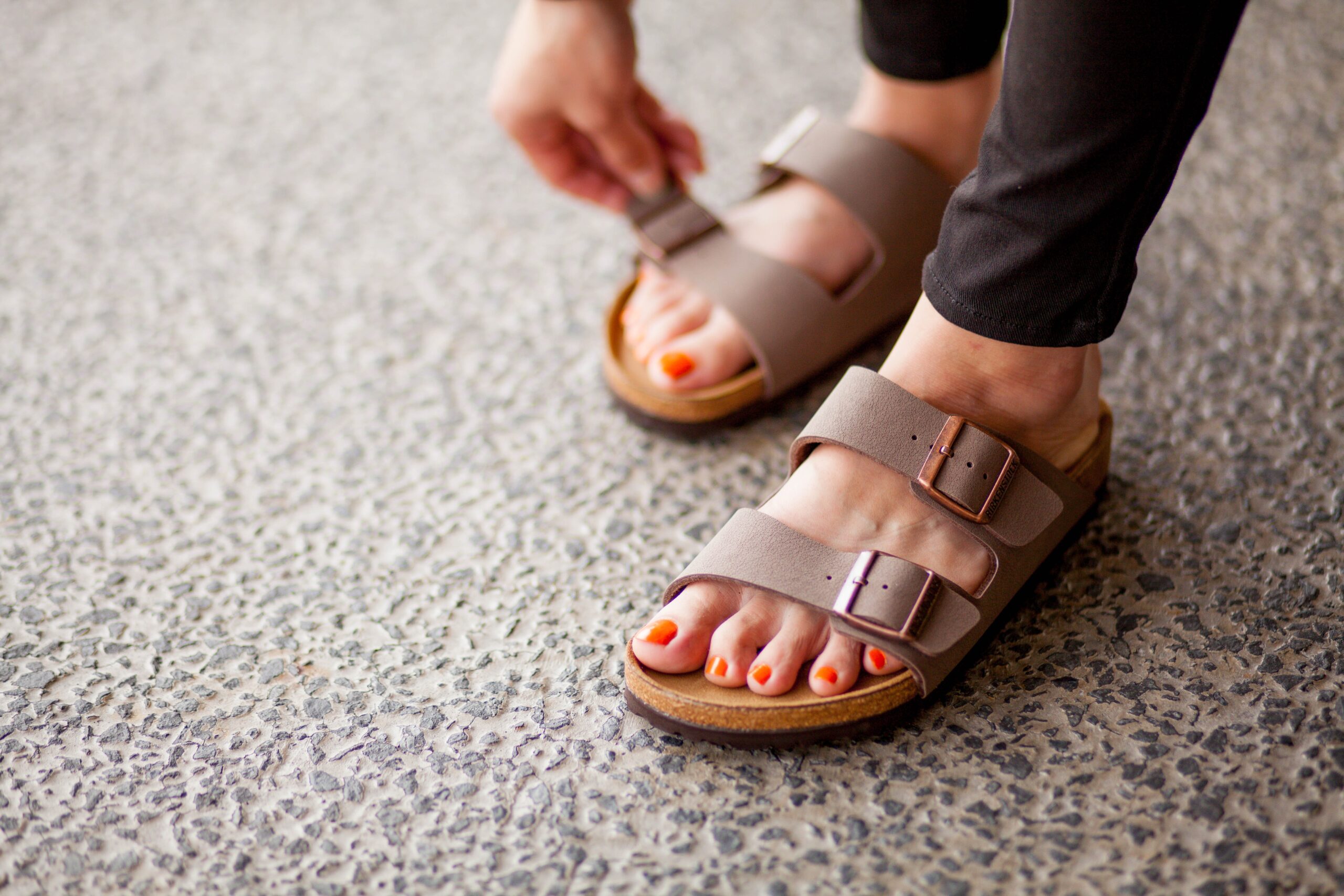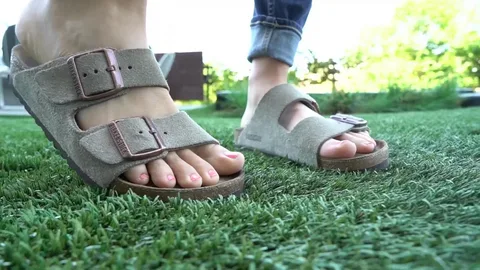If you’re one of the millions suffering from plantar fasciitis, you know how uncomfortable and painful it can be. This common condition causes sharp, burning pain in the heel or arch of the foot. Fortunately, there is a way to find relief from this condition – special slippers explicitly designed to help those with plantar fasciitis. In this blog post, we’ll discuss the benefits of wearing slippers for plantar fasciitis and how they can help bring you the relief you need.
What is Plantar Fasciitis?
Plantar Fasciitis is a foot condition that occurs when the plantar fascia, the thick band of tissue that connects your heel bone to your toes, becomes inflamed or irritated. The plantar fascia serves as a shock absorber for the foot and helps to maintain the arch of your foot. When this tissue becomes strained or overused, it can cause micro-tears, which lead to pain and inflammation. Plantar Fasciitis is a common condition among athletes, runners, and people who spend long periods on their feet. It can be a debilitating condition if not addressed promptly.
Symptoms of Plantar Fasciitis
Plantar Fasciitis is a painful foot condition that affects the plantar fascia, which is the band of tissue that runs along the bottom of your foot. Some of the common symptoms of this condition include:
- Pain in the heel or arch of the foot
- Stiffness in the foot
- Swelling or redness in the foot
- Pain that worsens with activity or prolonged periods of standing
- Pain that is most severe in the morning when you first step out of bed
If you are experiencing any of these symptoms, it is important to see a doctor or podiatrist for a proper diagnosis and treatment plan. Plantar Fasciitis can be a chronic condition if left untreated, so it is important to take care of your feet and seek treatment as soon as possible.
Causes of Plantar Fasciitis
Plantar fasciitis is typically caused by the repetitive stress of standing, walking, and running on hard surfaces for extended periods of time. Other factors that can contribute to the development of plantar fasciitis include:
- Improper footwear: Wearing shoes with poor arch support, a lack of cushioning, or inadequate shock absorption can increase your risk of developing plantar fasciitis.
- Age: As we age, the plantar fascia can become less flexible and more prone to injury.
- Overpronation: Individuals with flat feet or overpronation are at a higher risk of developing plantar fasciitis.
- Obesity: Excess weight puts added pressure on the plantar fascia, increasing the likelihood of injury.
- High-impact activities: Sports and activities that involve running, jumping, or other high-impact movements can place excessive stress on the plantar fascia.
By understanding the causes of plantar fasciitis, you can take steps to prevent its development or manage symptoms if it does occur. This includes wearing proper footwear and using special slippers designed to alleviate pain and provide relief.
Treatment for Plantar Fasciitis
Treating plantar fasciitis can be challenging, as it requires a combination of therapies that help relieve the pain and inflammation caused by the condition. Here are some of the most effective treatment options for plantar fasciitis:
- Stretching: Gentle stretching exercises can help loosen up the tight muscles and ligaments in your feet and ankles, reducing the pain and discomfort caused by plantar fasciitis.
- Rest and ice: Resting your feet and applying ice to the affected area can help reduce inflammation and swelling, providing immediate relief from the pain and discomfort of plantar fasciitis.
- Physical therapy: Physical therapy can help you regain strength and flexibility in your feet and ankles, which can help reduce the risk of further injury and speed up the healing process.
- Medication: Over-the-counter pain relievers like ibuprofen can help relieve pain and reduce inflammation caused by plantar fasciitis.
- Night splints: Wearing a night splint can help stretch the plantar fascia and the Achilles tendon while you sleep, which can help reduce pain and discomfort in the morning.
- Shoe inserts: Wearing shoe inserts, such as orthotics, can help redistribute pressure on your feet, reducing pain and discomfort caused by plantar fasciitis.
- Surgery: In rare cases, surgery may be necessary to treat plantar fasciitis that is severe or persistent.
Treating plantar fasciitis takes time, so be patient and stick to your treatment plan. With the proper care, you can reduce pain and inflammation and return to normal activities in no time.
Importance of Proper Footwear for Plantar Fasciitis
Wearing the proper footwear is crucial when it comes to managing plantar fasciitis. It can make all the difference for those suffering from this painful condition. The wrong footwear can exacerbate the symptoms and damage the plantar fascia further, whereas the proper footwear can alleviate pain, provide support, and prevent further damage.
Choosing shoes that provide sufficient arch support and cushioning for your feet is essential. Additionally, shoes with a wider toe box can help alleviate pressure on the toes and forefoot. Shoes with a heel that is too high or too low can also exacerbate symptoms, so choosing a shoe with a moderate heel is essential.
In addition to choosing the right shoes, it’s essential to ensure that your footwear fits properly. Too tight shoes can restrict blood flow and exacerbate symptoms, whereas shoes that are too loose can lead to rubbing and irritation.
Proper footwear for plantar fasciitis should also be lightweight and breathable to prevent overheating and moisture build-up. Many footwear brands now offer specialized shoes explicitly designed for plantar fasciitis, making finding a pair that suits your needs more accessible.
In summary, wearing the right footwear is critical to managing plantar fasciitis. Proper shoes can alleviate pain, support, and prevent further damage to the plantar fascia. When choosing footwear, look for shoes that offer arch support, cushioning, a wider toe box, a moderate heel, and a proper fit. Consider investing in specialized footwear for plantar fasciitis to get the most relief possible.
Benefits of Special Slippers made for plantar fasciitis
One of the most effective ways to alleviate the symptoms of Plantar Fasciitis is by wearing the right footwear. And when it comes to footwear, special slippers explicitly designed for people with Plantar Fasciitis can provide significant relief from pain and discomfort. Here are some benefits of wearing special slippers made for plantar fasciitis:
- Arch support: Special slippers made for plantar fasciitis have inbuilt arch support, which helps to distribute the weight of your body evenly and reduces the strain on the plantar fascia. This helps to reduce pain and inflammation in the affected area.
- Cushioning: These slippers come with extra cushioning, which helps to absorb the shock when you walk, stand, or run. This reduces the impact on your feet and provides comfort.
- Better traction: Many special slippers made for plantar fasciitis come with slip-resistant soles, which help to prevent slipping and sliding. This improves your grip on the ground and reduces the risk of falls and injuries.
- Breathable: Good-quality slippers made for plantar fasciitis are made from breathable materials that keep your feet dry and cool. This helps prevent fungal and bacterial infections, common in people with Plantar Fasciitis.
- Improved mobility: By reducing pain and discomfort, special slippers made for plantar fasciitis can help to improve your mobility. This means that you can move around more easily and do your daily activities with less pain and stress.
Features to look for in Special Slippers made for plantar fasciitis
When selecting special slippers made for plantar fasciitis, there are some features you should keep in mind to ensure maximum relief and comfort. Here are some essential factors to consider:
- Arch Support: Arch support is crucial for people with plantar fasciitis, as it helps distribute the body weight evenly on the feet. Look for slippers with good arch support that will prevent the overstretching of the plantar fascia.
- Cushioning: Cushioning is essential for reducing the pressure on the heels and balls of the feet. Choose slippers with cushioned foot beds or memory foam to provide extra support and comfort.
- Stability: Look for slippers that offer good stability and traction. This will help you maintain balance and reduce the risk of falls or slips.
- Breathability: People with plantar fasciitis often suffer from sweaty feet, leading to discomfort and skin irritation. Look for slippers made with breathable materials that will keep your feet cool and dry.
- Adjustability: Choose slippers that can be adjusted to fit your feet snugly. This will help prevent rubbing or slipping, which can exacerbate plantar fasciitis pain.
- Lightweight: Heavy slippers can put extra strain on your feet, aggravating plantar fasciitis symptoms. Look for lightweight slippers that will reduce the burden on your feet.
With these features in mind, you can find the perfect pair of slippers to provide the relief and support you need to manage plantar fasciitis. Remember to prioritize comfort and quality; you’ll be well on your way to happy, healthy feet!
Conclusion
Finding the proper footwear can make a difference if you’re suffering from plantar fasciitis. Investing in special slippers explicitly designed for this condition can help reduce pain and prevent further damage to your feet. These slippers offer unique features that cater to the needs of individuals with plantar fasciitis, such as arch support, cushioning, and shock absorption. Remember that finding the proper footwear is just one part of the treatment for plantar fasciitis. Follow your doctor’s advice, rest your feet when necessary, and practice stretching exercises to help alleviate pain and promote healing. With the right combination of treatments, you can say goodbye to the discomfort of plantar fasciitis and get back to enjoying your daily activities pain-free.
| Other Good Articles to Read |
| Skank Blogs |
| Unreal Blogs |
| Tba Blogs |
| All City Forums |
| Dany Blogs |
| Refuge Blogs |
| The Music Blogs |
| Key Forums |
| The Big Blog Theory |
| Joe Blogs |
| Blogs 4 Me |
| Blogs Emon |



